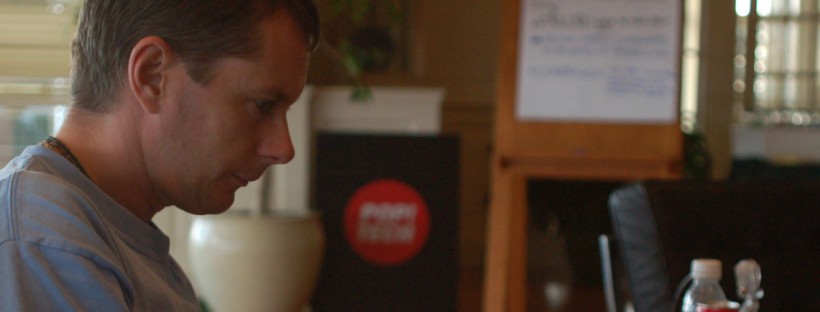A couple of weeks ago – in “The long tail revisited” – I briefly touched on the topic of “myths in the social mobile space”. It wasn’t the major focus of the post, but as is often the case it kicked off a completely separate discussion, one which took place largely off-blog in the Twitterverse and via email. I’ve been thinking more about it since, particularly as the social mobile space continues to hot up and people begin to face tools and projects off against one another – sometimes for the right reasons, more often for the wrong.
So, here’s my current “Top Ten” myths and misconceptions in this emerging field. Feel free to add, remove, agree, disagree, debate or dismiss. In no particular order…
1. “High-end is better than low-end”
Firstly, one mobile tool should never be described as being better than the other – it’s all about the context of the user. There is just as much a need for a $1 million server-based, high bandwidth mobile-web solution as there is for a low-cost, SMS-only PC-based tool. Both are valid. Solutions are needed all the way along the “long tail“, and users need a healthy applications ecosystem to dip into, whoever and wherever they may be. Generally speaking there is no such thing as a bad tool, just an inappropriate one.

2. “Don’t bother if it doesn’t scale”
Just because a particular solution won’t ramp-up to run an international mobile campaign, or health care for an entire nation, does not make it irrelevant. Just as a long tail solution might likely never run a high-end project, expensive and technically complex solutions would likely fail to downscale enough to run a small rural communications network. Let’s not forget that a small deployment which helps just a dozen people is significant to those dozen people and their families.
3. “Centralised is better than distributed”
Not everything needs to run on a mega-server housed in the capital city, accessed through “the cloud“. Okay, storing data and even running applications – remotely – might be wonderful technologically, but it’s not so great if you have a patchy internet connection, if one at all. For most users centralised means “remote”, distributed “local”.
4. “Big is beautiful”
Sadly there’s a general tendency to take a small-scale solution that works and then try to make a really big version of it. One large instance of a tool is not necessarily better that hundreds of smaller instances. If a small clinic finds a tool to help deliver health care more effectively to two hundred people, why not simply get the same tool into a thousand clinics? Scaling a tool changes its DNA, sometimes to such an extent that everything that was originally good about it is lost. Instead, replication is what’s needed.

5. “Tools are sold as seen”
I would argue that everything we see in the social mobile applications ecosystem today is “work in progress”, and it will likely remain that way for some time. The debate around the pros and cons of different tools needs to be a constructive one – based on a work in progress mentality – and one which positively feeds back into the development cycle.
6. “Collaborate or die”
Although collaboration is a wonderful concept, it doesn’t come without its challenges – politics, ego and vested interests among them. There are moves to make the social mobile space more collaborative, but this is easier said than done. 2009 will determine whether or not true non-competitive collaboration is possible, and between who. The more meaningful collaborations will be organic, based on needs out in the field, not those formed out of convenience.
7. “Appropriate technologies are poor people’s technologies”
A criticism often aimed more broadly at the appropriate technology movement, locally-powered, simple low-tech-based responses should not be regarded as second best to their fancier high-tech ‘Western’ cousins. A cheap, low-spec handset with five days standby time is far more appropriate than an iPhone if you don’t live anywhere near a mains outlet.

8. “No news is bad news”
For every headline-grabbing mobile project, there are hundreds – if not thousands – which never make the news. Progress and adoption of tools will be slow and gradual, and project case studies will bubble up to the surface over time. No single person in the mobile space has a handle on everything that’s going on out there.
9. “Over-promotion is just hype”
Mobile tools will only be adopted when users get to hear about them, understand them and are given easy access to them. One of the biggest challenges in the social mobile space is outreach and promotion, and we need to take advantage of every opportunity to get news on available solutions – and successful deployments – right down to the grassroots. It is our moral duty to do this, as it is to help with the adoption of those tools which clearly work and improve people’s lives.
10. “Competition is healthy”
In a commercial environment – yes – but saving or improving lives should never be competitive. If there’s one thing that mobile-for-development practitioners can learn from the wider development and ICT4D community, it’s this.


Great list. Your commitment to doing what’s right for the bottom of the pyramid really shows through the thoughtful list above. I’ve enjoyed following your blogs because they really reflect your thinking in this area. If you want a review written on any environmental sustainability mobile apps, I’d be happy to help spread the word. Mobile env susty apps are my passion, no matter which type of mobile phone. Please check out my new blog – working on building content here to spread the word on susty on the go.
Another great post!! I agree with Amelie — its the personal connection in your writing that I find most enlightening. You’re right from other posts that there seems to be a lot of talk about ’09 and the ‘year of mobile’. Maybe there’s more chance it will happen if people are honest about what needs to change to make it succeed. Great stuff!!!
Ken,
Nice insights here on intl dvpt tools – especially the view that replication can be as important as ability to scale.
I’ve tweeted as much too: http://twitter.com/charmermark/statuses/1171198122
Cheers
Mark
Hi, Ken,
I found your top 10 misconceptions refreshing, but I had trouble with one of them, the scalability issue. You’re quite right that specific applications may be quite valuable locally, even if they don’t scale — even more so if they are developed locally because of the added experience component.
However, if you’re a major NGO or other donor, and you’re looking to invest in ICT solutions for developing environments, then I think that you ware wise to look not only for scalability but also replicability in different environments when you make your investments. The catch is that killer apps are difficult to identify, much less create.
My bottom line is that both local and scalable applications can be worthwhile. I just wish we could identify more of the latter. My hope for the former is that the experience gained by those who fashion the local apps will grow both to create a richer set of apps in the future and to create a trained cadre of developers.
Regards,
George
Great post.
I have been working with mobile platforms for a while and I seen how scalling up can completely change the usage of an application.
It would be great if there was a means to share some of the smaller platforms and applications so that people can replicate sucessful applications without reinventing the wheel. We need to identify some of these smaller implementations because we only seem to hear about large scale projects.
2. “Don’t bother if it doesn’t scale”
I love this point. So often projects are so focused on making a scalable project that they forget the small group of folks right in front of them in need right now.
Thanks for all the great, positive comments. I’m glad some of this struck a chord, and think it’s important that we address these issues if mobile really is to break-through this year.
@Amelie – I’d be very interested in seeing what a look at environmental sustainability mobile applications would like like, if you’re interested in exploring further?
@Mark @Tracy – It’s crucial that we don’t get bogged down in scale. It may take more resources to cover the same population levels by replication alone, but that then ties in with the crucial issue of local ownership, and point #3
@Phillip – Have you seen Tactical Tech’s “Mobile Toolkit”? What you suggest can be quite tricky going by the very nature of mobile tools (some are mobile-based, some PC-based, some server-based, some operator-hosted, etc). They’ve been brave enough to try to put a kit together. See:
http://mobiles.tacticaltech.org
@George – I agree with everything you say. The whole scalability question feeds into many of the other Top Ten, of course, but locally ‘owned’ and run solutions are generally more successful at gaining the trust and local ownership so essential for a tool to work. Since I’m not an international NGO (thank goodness!) I’m able to avoid the very real issues that you raise. I just wish many more would think less of scale and more of the impact/replication potential
Ken, I’m finally getting around to posting some comments 😛 And the folks before me have already provided a lot of great feedback. So, I think I’ll focus on a few things that haven’t already been discussed.
“High-end is better than low-end” – I couldn’t agree with you more that it’s really about appropriate application. In my limited travels, I have seen wide variations in technology infrastructure and access. The trick is to figure out what will work best in context (technological, sociocultural, political, etc.).
“Centralised is better than distributed” – One key element of my approach to my work has always been sustainability. Devoloping local capacity & and an enabling environment are steps along the pathway to that. Localization & distribution equals empowerment & is more likely to lead to long-term viability.
“Collaborate or die” – A wise man (the Jhpiego COO, Joe Judd) once said, “collaboration & competition are not mutually exclusive.” There will always be opportunities to work together while still providing plenty of space for individual success. No one person or organization owns the Internet but plenty of money has been made off of it.
“Over-promotion is just hype” – Don’t forget about promoting failure, too. In fact, in some way, failure is more important to good design than success.
“Competition is healthy” – Your position is a bit idealistic, but i ultimately agree 🙂 Of course, there is one side of me – the AI, neural networking, complex systems side – that sees immense potential for real innovation in a space that fosters healthy competition. The trick is to never lose sight of the ultimate goal: helping others.
As always, great post! Keep ’em coming…
RT @kiwanja Posts which formed basis of his AWESOME talk at “Computing on the Margins”: http://is.gd/i99G & http://is.gd/w2Yb
Top 10 mobile misconceptions! http://www.kiwanja.net/2009/02/social-mobile-myths-and-misconceptions/ http://fb.me/E9Fqgi8H
RT @darajatz: Top 10 mobile misconceptions! http://www.kiwanja.net/2009/02/social-mobile-myths-and-misconceptions/ http://fb.me/E9Fqgi8H